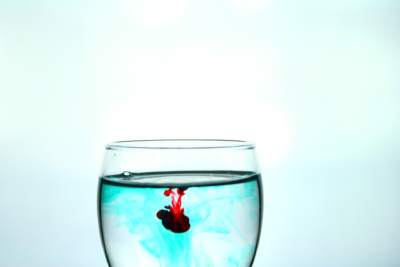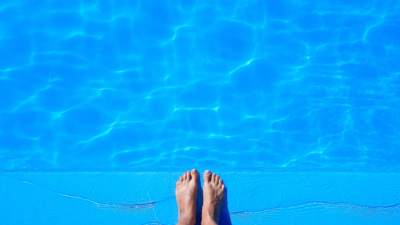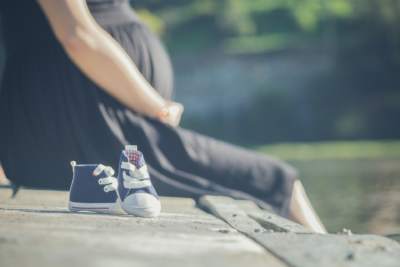An amorphous red glob has invaded my underwear. It collects in a pool, spreading across the polka dotted fabric with what my eleven-year-old brain declares a vengeance. I look down into the liquid substance that has turned my Wednesday underwear into an abysmal crime scene. From the upstairs bathroom, I call for backup in the form of my mother.

“MOM! I’m dying!”
Frantic footsteps on the stairs, and she appears with curls flailing. “What’s going on?!”
I present the evidence to her with shame. By this time, my younger sister has abandoned our Barbie game (we utilized our one Ken doll to play out The Bachelor) to see what the commotion is about. She peeks in, concern across her face, before my mother shoos her away. She sits on the edge of the bath tub, pushing aside toys and a bottle of Hello Kitty bubble bath.
“Oh, Emily,” she says, “You’re not dying. This is an incredibly beautiful thing. It’s your period.” I imagine her giving me a big smile here, unwrapping a sanitary pad with triumph. “It means that one day, you’ll be able to have children.”
On a recent phone call with my mother, she reminded me that upon hearing this news, I began to cry hysterically.
“But, you were always an emotional child,” she is quick to tell me. “You know, the kindergarten teacher called me out of the blue one day to tell me you had been talking about Hitler and World War II at the coloring table…”
* * * * *
In World War II, when women arrived at the concentration camps, the Nazis shaved their heads first. The experience of being a woman in the camps differed in various ways, but one such way was through menstruating. I read that most women didn’t even get their periods when they were in the camps. Sometimes, your body does that, just doesn’t give you a period when it thinks that you have enough on your plate. One survivor said that not getting a period was awful, made her feel as though as she was already an elderly woman.
The women who did menstruate were often beaten incessantly. Not having been given any proper materials to use to keep themselves clean, the kapos would mock the women for being unclean. The blood stains were a sign for them that the Jews were, in fact, unclean – that Jewish women could not clean themselves. There are stories of Jewish women with blood running down their legs like animals.
I think about these women when I recall a story I have known since I was a young adult. I have a distant cousin that I have never met named Lena, a woman who ended up widowed and childless during the war. Eventually, she made her way to what was then known as Palestine before settling with my grandmother’s family in Detroit. The story goes that Lena’s husband was dragged away to a camp. Lena had watched as her infant child was shot and killed by Nazi officers.
* * * * *
The title given to the menstruating woman in Judaism is niddah, a noun that means “moved or separated,” that has also come to mean impure. The term originates in the book of Leviticus of the Tanakh, the Hebrew Bible. Leviticus 18:19 rules that a woman “in her (state of) niddah should not come close to you with intent to reveal her nudity.” The rabbis of the Talmud read this line as a prohibition against women having sex with their husbands while on their period.
At thirteen, I attend my cousin’s bar mitzvah. He stands before the congregation with the Torah scroll unfurled before him. His hands are shaking as he maneuvers the yad with fumbling, teenage boy fingers. He chants his portion, the very one that pertains to niddah, with broken Hebrew. It is the first time that I even consider that Judaism could have something to say about periods. Isn’t religion meant to respond to earth-shattering cosmic realities and questions like life after death, why good things happen to bad people, and the like? How could my body’s ability to bleed this way have anything to do with any of these questions?
The kids in the audience giggle during his speech, and I probably join them. It’s easier to laugh at bodies than to recognize the parts of our lives, the bodily functions that radically rip us into being.
“Gross,” one of his camp friends mutters. This off-hand comment makes me hyper aware of my body and its ability to bleed endlessly for seven days and not die. I didn’t choose this, but does it make me gross?
Am I gross?
More than just the texts in Leviticus, the rabbis developed an entire body of myths and laws around the menstruating woman. She became demon-like, imbued with an almost supernatural power. One Talmudic text reads that when a “menstruating woman walks between two men – if it is the beginning of her menstruation, she will cause one of them to die. If it is at the end, then she will bring strife to them.” Another text warns that a niddah shouldn’t “cut her fingernails, lest a husband or child accidentally step on the clippings, and as a result, develop boils and die.”
Because of the danger that she poses to her family/friends/loved ones/lovers, the niddah is kept under a strict spiritual regiment. She can’t touch her husband, or else she will pass impurity to him. She can’t touch the Torah, or else she’ll make it impure. The good news (?) is that a woman doesn’t stay niddah forever. After seven clean days pass where there is no discharge, she can go to the mikveh, the collection of rainwater that she will dip in once, twice, three times and be purified.
Purify me with hyssop, and I shall be clean; Wash me, and I shall be whiter than snow. (Psalm 51:7)
* * * * *
I encounter mikveh practice for the first time in an undergraduate seminar on feminism and religion. In its essence, the mikveh is the rabbinically constructed response to the concept of spiritual impurity. When I first read about it as a freshman, I can’t imagine a ritual more archaic, more outdated, more useless than something that marks the cycle of a period. The ritual isn’t for me, I remind myself through the process of learning about it, though the tag of its Jewishness draws me closer as it repels me.

“What interests me about it is that it’s just so ancient,” one of my classmates comments. We are in a secular institution, engaged in whether or not this ritual that does not belong to us has any validity. “How cool is it to do something that people have always done?”
I think of my own cast of Jewish women in my life. The Roman Catholic blood within me thinks of the baptismal font that I was dunked in, the same ritual that my family had undergone for years. I was almost certain that none of the Jewish women in my life had followed this ritual, had given any sort of Jewish credence to the monthly phenomenon of the shedding of their uterine lining. What exactly made a menstruation cycle Jewish? Was my mom, and her mom, and her mom, and her mom niddah without their ever recognizing it?
When I asked my grandmother if she had ever gone to the mikveh, she laughed.
* * * * *
“My menstrual ritual is ancient, so ancient, from the very beginning of my people’s history. It has survived historic catastrophes, expulsions and wanderings. It has also survived – barely – these centuries’ cultural hang-ups toward menstruation itself: superstitions which are really fear and loathing of woman body herself, woman deep mysterious fertile magic body and her times.” — Mierle Laderman Ukeles, “Mikvah Dreams: A Performance” (1979)
My grandmother, Roberta, is a spitfire Scorpio, a jewelry junkie, a world traveler, a leather pants wearer. I call her up on a rainy afternoon.
“Grandma, can you tell me about the first time you got your period?”
The question successfully catches her off guard, something that isn’t easy to do with Roberta. She thinks for a moment before responding, “I was angry when I got it. I was eleven, and that’s quite young.” Grandma Bertie was born in Detroit in the early 1930s. My great grandfather, Morton, narrowly escaped World War I by getting on a boat from Germany to Chicago. All 12 of his siblings perished in the Holocaust.
“Once, my mother, who you never met, told me to get her pads from the store. I was so, so angry,” she said. Grandma Bertie’s voice has that tone when someone is recalling a distant memory, something just beyond their grasp. “I didn’t want to be seen with it. In those days, pads came wrapped individually, in little brown bags. I asked my mother if boys ever had something like this to worry about. She said no. That made me mad, too.”
I realize that in no other other circumstance would I ever hear this much about my own grandmother’s menstrual cycle. I realize that I am hearing a rather obvious fact, that my great-grandmother menstruated, that it is in fact one reason in the list of cosmic ways that I am here today. I have known my grandmother my whole life, and I have never asked her about her experiences having a period and a body.
In an average life cycle, a woman will menstruate 450 times. Without taking into consideration clots, an average cycle produces about a half a cup of blood – 225 cups of blood, just over 14 gallons in an entire lifetime.

My mom thought she was broken. Her period didn’t come until she was fourteen, and once it came, she had wished it never had. “I was in excruciating pain,” she tells me. “I was diagnosed with polycystic ovaries. They thought I may never get pregnant.” My mother grew up in the Reform Jewish synagogue that my great grandparents had helped to found, though her connection to Judaism was lackluster.
“When I realized I was pregnant with you, I was elated,” my mother tells me. I am the oldest of two children, though my mother’s first ultrasound with me showed not one but three fertilized eggs.
“I thought you were going to be a triplet. The next time I came to get a check up, and there was just one heartbeat. It was sad, but I was happy that you were okay.”
As we’re cleaning up from the meal we’ve shared together, my mother tells me in a hushed tone, “Your father and I agreed to raise you as both Catholic and Jewish, but I always hoped you’d be Jewish,” she begins sudsing plates in the sink, reminding me of the time when she jumped to my rescue when I got my first period. “My periods stopped when I was 51. They became lighter and lighter every month, and one month… it just never came,” she turns to me, and I note tears are in her eyes. “I wish I had more children.”
* * * * * *
Freshman year of college, I spend $80 on a Plan B pill. I cut through the complex packaging for the capsule. When I take the pill, relief spreads through me. It’s not until my period comes – as it always does – that I think of Lena and her baby. I am not ready to be a mother. I am pro-choice. These arguments do not sustain me as I think about the almost life, the not quite person that I realize I had the crazy potential of making. My period is a sign that I am a Jewish woman with the ability to bring a Jewish life into this world. Is this period a sign of a life that shouldn’t have existed? A life that I didn’t want to exist? What would Lena say?
I watch as the blood swirls down the toilet.
* * * * *
I decide to go to the mikveh for the first time for my twenty-first birthday. I stop in The Strand to pick up a copy of Rilke poems to read when I immerse. I have a bag full of relics – a baptismal stole and the letter that the rabbi wrote to me about why he gave me my Hebrew name, Esther Sara. In the crowded, dirty bathroom, I note the familiar stain of red in my underwear. I frantically pick up my cell phone to call my rabbi.
I speak in a stage whisper to her over the phone. “I am going to the mikveh in fifteen minutes and I have my period. This is a Jewish nightmare. I can’t go, can I?” My anxiety is hitting a crescendo. Just like in every good ritual, there is an element of anxiety, that the entire cosmos somehow rests upon me getting my naked body into that pool of water. I feel the opportunity so deeply in my bones to write my own Jewish genealogy and history and lineage.
My rabbi laughs. “You’d think so, with all of those things that we read about what the rabbis think about periods. Do you wanna know something? The only thing that can make a mikveh not kosher, Emily, is a certain amount of black ink being spilled into it.”
I let out a sigh of relief. It sounds unreal, that after all of what I’ve learned, that even though they are niddah, women can go into the mikveh when they’re on their period. I am about to hang up, to finally pay for my book that I totally should not have in the bathroom with me, when the rabbi stops me.
“You know what I think is so cool about water? There’s no new water. The water that we drink with, shower with, immerse in… that’s all water that’s been recycled. It’s water that’s been around since Genesis 1:1, from that watery chaos where we first meet G-d.”
I am standing before my own watery chaos. My hair is dripping fat, pink drops onto my bath robe. My mikveh guide stands behind me, humming a tune that sounds both new and ancient. When I enter the water, my entire being becomes one. I am pink droplets and pure Edenic water, and blood – always that life force – flowing together. I am not just myself, I never have been. I am all the women who have come before me, and maybe even all those who will come after.
* * * * *
I write this as I bleed.
My best friend is sprawled out on my bed while I write, “Why are you writing this?”
I avoid going on a spiritual diatribe, but I allow myself to be vulnerable and share the truth. “I’m thinking that maybe my period might connect me with all of my ancestors. Like, all of the Jewish women that came before me.”
She rolls over on my bed, a frown settling on her face as she mulls over what I’m thinking. “My period is just that, though. It’s mine.”
“Where did your period come from?” I ask.
“My uterus,” she responds.
“Where did your uterus come from?”
“My body.”
“Where did that come from?”
“Another body.”
“Where did that body come from?”
“Another body.”
“Where did that body come from?” I press further. We are going into that space that is uncharted, where a conversation becomes just a bit nerve wracking and the air is heavy and sweet.
She smiles, shrugging. “The cosmos?”
My period will end one day. For now, it will continue – as cycles tend to do.
Emily Rogal is a first year Master of Divinity candidate at Harvard Divinity School. She is a Jewish educator, a labor and postpartum doula, and a mikveh guide for Immerse NYC, a feminist, egalitarian mikveh group.
![tulip-115322_1920 |[Public Domain], via Pixabay](https://newvoices.org/wp-content/uploads/2017/11/tulip-115322_1920.jpg)
